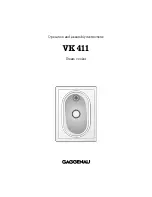
The Rome Electric Bicycle User’s Guide
TPS Training Bulletin
Page 12
The Battery
This section details what you need to know about the battery that powers your e-bike.
Always remember to treat your e-bike’s electrical systems with respect.
Battery Power
The dashboard has a battery charge indicator. When the e-bike is activated, the needle will
jump and indicate the currently available battery power.
If the power has dropped significantly, you should charge your e-bike.
Distance and Power
Your battery has the capacity to carry you anywhere from 35 to 50 km before it must be
recharged. The ability of your battery to power your bicycle depends on many variables.
These variables include the weight of the rider, the prevailing wind resistance, the rider’s
driving habits, the presence of steep hills and inclines, and other issues such as proper air
pressure in the tires.
Saving Power
If you are traveling long distances, you can save a lot of electricity by using better driving
habits.
•
Coasting:
When going downhill or over long, flat road surfaces, try using your e-
bike’s momentum and allow it to coast, without drawing power from the motor.
•
Stopping and Starting:
Try to avoid stop and go movements. The motor draws
more power when starting from a full stop.
•
Weight:
Remove unnecessary weight from the bike. This reduces the amount of
power the motor must draw.
•
Air Pressure:
Make sure your tires have the proper air pressure. Proper pressure
reduces drag on the tires and radically increases the efficiency of any vehicle.
•
Head and Tail Lights: T
urn off the lights to conserve power, if it is safe to do so. The
lights will reduce the distance you can travel by about 5%.
•
Pedaling:
When accelerating from a full stop, you might want to try pedaling to help
acceleration











































